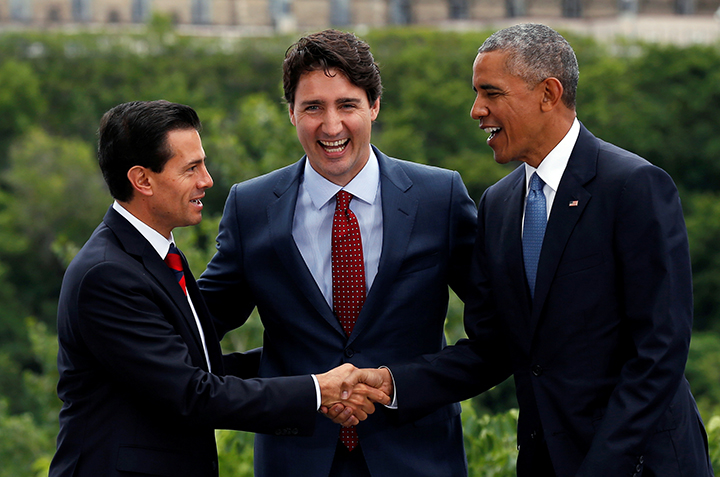 The climate change partnership announcement made by the leaders of Canada, the United States, and Mexico at the North American Leaders Summit on June 29 continues the political ambition of the three countries to work toward a low-carbon future. The announcement follows commitments made in the COP-21 Paris climate agreement to reduce carbon emissions.
The climate change partnership announcement made by the leaders of Canada, the United States, and Mexico at the North American Leaders Summit on June 29 continues the political ambition of the three countries to work toward a low-carbon future. The announcement follows commitments made in the COP-21 Paris climate agreement to reduce carbon emissions.
The announced goal of achieving a collective fifty percent clean electricity system by 2025 comes at a time when the United States, Canada, and Mexico are expanding renewable energy investments and increasing the use of natural gas to substitute for coal, and in Mexico’s case, oil. These efforts are driven by shared concerns surrounding climate change, the extension of the wind and solar tax credits in the United States, the historic energy and electricity reforms of President Enrique Pena Nieto, and Canada’s interests in exporting hydroelectric power to the United States.
Each country is at a very different stage in their respective transitions to low-carbon economies. With its enormous hydro resources, Canada is only twenty percent dependent on fossil fuel, while Mexico and the United States are 78 percent and 66 percent dependent on coal, gas, and oil, respectively. The current overall level of non-fossil generation is about 37 percent for the three countries combined (of which nuclear accounts for 48%, hydro 35% and non-hydro renewables 17%. So the 50 percent goal is quite a challenging one, especially given the possibility that several nuclear plants in the United States will be closed and gas prices will remain low.
There is no question that Mexico, Canada, and the United States have significant renewable energy resource potential. The United States and Mexico have a diverse mix of high-quality solar, wind, geothermal, and biomass while Canada has footholds in hydro, wind, and biomass sectors. In their assessments of the United States and Mexico, the International Renewable Energy Agency (IRENA) concluded that it would be possible with the right policies and a scale-up in investments for the United States to generate close to 50 percent of its electricity from renewables by 2030, with Mexico at 46 percent. Mexico currently has a goal of generating 35 percent of its electricity from renewable sources by 2024.
The Obama administration has admitted that achieving the collective goal by 2024 is a stretch, but continued declines in renewable costs, advances in technologies such as batteries and utilities desire to diversify their generation mix, suggests it is not out of the question, especially with strong energy efficiency efforts.
The process could also be advanced through increased integration of the electric systems between the three countries; new transmission interconnections were highlighted in the summit announcement. The United States is already well connected with Canada. The Northeast and Midwest regions obtain clean, low-cost energy supplies from Canada, largely from Quebec Hydro and Manitoba Hydro power companies. New transmission lines are planned to expand this capacity, which complements and supports current wind energy systems in the Midwest. Cross-border links with Mexico are currently limited, but new lines are planned for the export of renewable power from Mexico to build on the connections already in place between Baja and Southern California, and vice versa, to the United States and gas power plants in Texas in exporting to Mexico.
Whether the next US administration continues to support energy integration remains to be seen. Either way, it is bound to have important consequences not only for the three economies but also for the entire Western Hemisphere with its continued growth as a clean and efficient energy powerhouse.
Robert Ichord is a nonresident senior fellow with the Atlantic Council’s Global Energy Center.
Image: From left: Mexican President Enrique Peña Nieto, Canadian Prime Minister Justin Trudeau, and US President Barack Obama shake hands while posing for the family photo at the North American Leaders’ Summit in Ottawa, Canada, on June 29. (Reuters/Chris Wattie)
